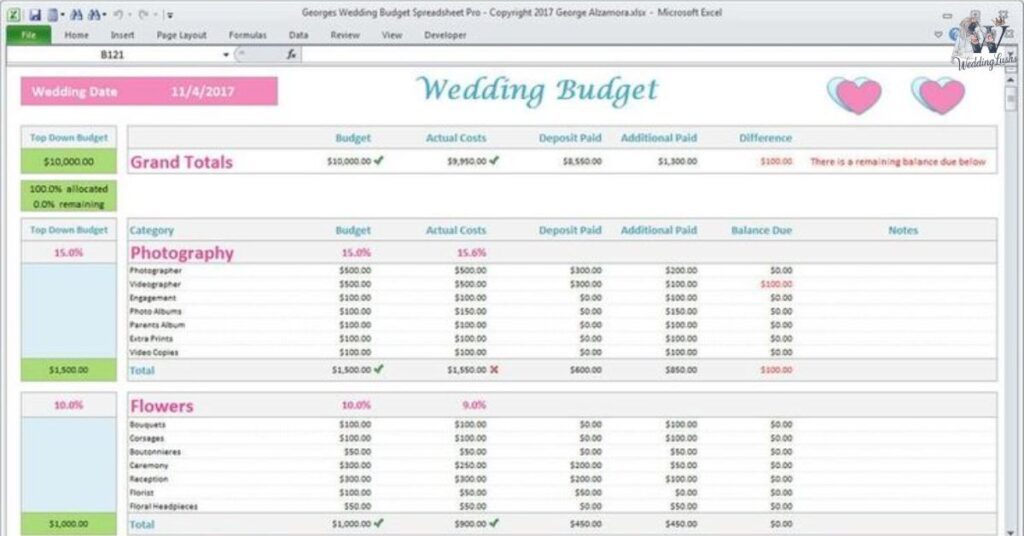Planning a wedding can be exciting with budget secrets, but figuring out how much it will cost can feel overwhelming. From venues to catering, the expenses can add up quickly, leaving many couples wondering how to create a wedding budget that works for them. Understanding the secrets behind the average wedding budget can make this process easier and help you feel more confident about your spending.
In this guide, we’ll break down the key elements of a wedding budget, share tips for saving money, and highlight some hidden costs to watch out for. Whether you’re planning a small gathering or a grand celebration, these insights will help you stay on track while still creating the wedding of your dreams.
Average Wedding Budget Basics
The average wedding budget in the U.S. is around $33,000, but it can vary greatly. Couples should start by setting a realistic budget based on their savings and any family contributions. Allocating funds wisely will help ensure you stay on track and avoid financial stress.
Determining Your Overall Budget
Start by looking at your savings and what you’re comfortable spending. Think about any family contributions and how much you can save before the wedding. Set a clear limit to avoid overspending. Your budget should reflect your financial reality, not just your wedding dreams. This overall budget will guide all other decisions.
Allocation of Funds
Once you’ve set your budget, divide it among the key areas of the wedding. Typically, the biggest portion goes to the venue and food. Some money should also go toward photography, attire, and entertainment. Be flexible and adjust based on what’s most important to you. Always leave room for unexpected costs.
Hidden Costs to Consider
Weddings often come with surprise expenses that are easy to overlook. Here are some hidden costs to keep in mind:
- Gratuities and tips for vendors
- Taxes and service fees
- Postage for invitations
- Dress alterations
- Extra décor or rentals
Average Wedding Budget Secretes: Major Expense Categories
Venue, catering, and entertainment often take up the largest portion of the wedding budget. On average, 37% of the budget goes to the venue alone. Other major expenses include attire, photography, and flowers, so it’s important to prioritize based on your preferences.

Wedding Venue and Accommodations
The venue will likely be your largest expense, taking up about 30-50% of your budget. Consider the size, location, and style of the venue. Some venues also provide catering, which can help you save. Don’t forget to account for guest accommodations if needed.
Catering and Food
Food is a big part of any celebration, and wedding catering can get pricey. The cost often depends on the number of guests and the menu. Buffets might be more affordable than plated dinners. Also, remember to include drinks and the wedding cake in your budget.
Also read this: Navigating Venue For Wedding Reception Venue Costs With Ease
Attire and Beauty
Your wedding dress and suit will be special purchases, but they don’t have to break the bank. Look for sales or consider renting attire. Beauty services like hair, makeup, and nails should also be factored into your budget. Don’t forget any accessories like shoes or jewelry.
Photography and Videography
Capturing your big day is important, and professional photographers and videographers can be costly. This is one area where many couples choose to invest more. Look for packages that offer both photo and video services, or see if a friend can help.
Music and Entertainment
Entertainment sets the mood for your wedding day. Live bands or DJs are common choices, but prices vary widely. Keep in mind the cost of additional features, like a photo booth or special lighting. Compare prices and reviews to find the best fit for your event.
Understanding Average Wedding Costs and Service Standards
When planning your wedding, it’s essential to know what you’re paying for and the quality of services you can expect. Here are some key points to help you understand average costs and service standards:
Low-cost services can mean lower quality: While it’s tempting to save money, cheaper vendors may not meet your expectations.
Read reviews and ask for recommendations: Check other couples’ experiences before making a decision.
Higher prices usually reflect experience and quality: For key services like photography or catering, it’s often worth the investment.
Understand what’s included in packages: Ask vendors for a detailed breakdown of services so there are no surprises.
Practical Tips for Wedding Budgeting
Start by determining what matters most to you and allocate more of your budget to those areas. Use budgeting tools to track spending and stick to your plan. Keep a 5% buffer for unexpected costs like tips, taxes, or last-minute changes.
Utilizing Budget Tools
Budgeting tools are a lifesaver when planning a wedding. Use online apps or spreadsheets to track your expenses. Some tools let you categorize spending and alert you when you’re close to the limit. Staying organized will help you avoid stress and keep your finances in check.
Prioritizing Key Elements
Identify what’s most important to you and allocate more of your budget to those areas. Maybe you value stunning photos or want a gourmet meal. Prioritize these elements while cutting costs on less important things like favors or transportation. This way, you can have the wedding you want without overspending.
Managing Guest List Efficiently
The size of your guest list directly impacts your wedding budget. More guests mean higher costs for food, drinks, and seating. Be firm with your numbers and avoid inviting too many people out of obligation. Keeping the guest list small allows you to stay within your budget while maintaining a more intimate atmosphere.
- Prioritize close family and friends
- Set a firm guest limit
- Avoid inviting out-of-obligation
- Consider a smaller, more personal event
- Track RSVPs closely to prevent unexpected expenses
Navigating Wedding Venues and Vendors
Choosing the right venue and vendors can make or break your wedding day. Compare several options to find the best value for your budget. Don’t be afraid to negotiate prices or ask for package deals that suit your financial needs.

Selection Strategies
There are many ways to reduce wedding costs without sacrificing quality. Choose off-peak dates, such as weekdays or winter months, for venue discounts. Simplifying the menu or opting for a buffet instead of a plated meal can also save money. DIY décor or invitations can trim costs, and renting attire instead of purchasing is another smart move.
Cost Reduction Techniques
Negotiating with vendors is essential to getting the best value for your money. Always ask if there’s room for discounts or if they offer custom packages. Be upfront about your budget and what you can afford. Many vendors are willing to adjust their services to meet your needs. Make sure you understand what’s included in the contract to avoid hidden fees.
Vendor Negotiation
While small, extra touches can make your wedding feel more special, they can also add up quickly. Personalize elements like wedding favors or seating cards without going overboard. Handmade or DIY items can add a personal feel at a lower cost. Keep in mind that these extras should fit into your budget and enhance the experience, not drive up costs unnecessarily.
- Focus on meaningful extras
- Consider handmade or DIY touches
- Stay mindful of your budget
- Use personal touches to enhance, not inflate costs
- Limit the number of added details
Additional Elements Influencing Cost
Unexpected costs like gratuities, permits, and overtime fees can add up quickly. Personalized touches such as gifts for the bridal party or additional décor might also influence your final budget. Seasonal and regional variations can impact overall expenses, too.
Extras and Personal Touches
While small, extra touches can make your wedding feel more special, they can also add up quickly. Personalize elements like wedding favors or seating cards without going overboard. Handmade or DIY items can add a personal feel at a lower cost. Keep in mind that these extras should fit into your budget and enhance the experience, not drive up costs unnecessarily.
Seasonal and Regional Variations
Wedding costs can vary depending on the season and location. Prices often spike during peak wedding months like spring and summer. Consider planning your wedding during off-season months for discounts. Similarly, costs in urban areas may be higher than in smaller towns. Choosing a location with lower costs can make a big difference to your overall budget.
Financial Considerations for After the Wedding
After the wedding, managing finances as a couple becomes a priority. Be mindful of any wedding-related debt and create a plan to pay it off quickly. Establish a joint savings account and focus on building an emergency fund for the future.

Managing Post-Wedding Expenses
After the wedding, managing leftover expenses is crucial for starting your married life financially sound. Pay off any wedding-related debts, like credit card balances or loans, as soon as possible. Set up a budget for your new life together, including savings for future goals. Establishing an emergency fund is also a good idea to prepare for any unexpected expenses.
- Pay off wedding debts quickly
- Set up a household budget
- Create a savings plan for future goals
- Establish an emergency fund
- Reflect on your wedding budget to improve future planning
Innovative Ways to Enhance Wedding While Reducing Costs
DIY projects and digital tools are great ways to enhance your wedding while staying on budget. Consider creating your own décor or using apps to help plan and save. Choosing off-peak dates or smaller venues can also reduce costs without sacrificing quality.
DIY Projects
DIY projects are a great way to save money while adding a personal touch to your wedding. You can create your own wedding invitations, décor, or even centerpieces. Look for online tutorials or use platforms like Pinterest for inspiration. Involving friends and family in these projects can also make the process more enjoyable and help you stay within your budget.
Leveraging Technology and Apps
Technology can help streamline wedding planning and reduce costs. Use budgeting apps to track expenses and stay within limits. Digital invitations and RSVPs can cut down on stationery and postage costs. Many couples also live-stream their weddings to include guests who can’t attend, saving on travel and accommodation costs.
Final words
Uncovering the secrets of the average wedding budget is essential for a stress-free and enjoyable planning process. By understanding key cost areas—like venue, catering, and attire—couples can allocate their funds more effectively. Smart strategies, such as managing the guest list, negotiating with vendors, and utilizing technology, help in staying within budget while still creating a memorable celebration.
Incorporating DIY projects and being mindful of seasonal and regional variations can further reduce costs. Post-wedding, managing expenses, and planning for future financial goals ensures that the excitement of the wedding day doesn’t turn into financial strain. Ultimately, a well-planned budget allows couples to focus on what truly matters: celebrating their special day with loved ones without unnecessary financial worry.
Frequently asked questions
What is the most common budget for a wedding?
Wedding costs in the U.S. can range from $5,000 to over $100,000, with the 2024 average at $33,000. However, this figure may not reflect your personal budget needs.
What is the most expensive part of the wedding budget?
The venue can significantly impact your budget, often consuming up to half of your total wedding costs. Prices vary based on location, size, and type.
How to split wedding costs?
Costs can be split between the bride’s and groom’s parents, divided equally among both sets of parents and the couple, or covered entirely by the couple themselves.
How do you estimate wedding guests?
Local guests, including spouses and children, expect about 85% to attend. For out-of-town guests, plan on 55% attending, but if they are close family, this could increase to 85%.
Who pays for the wedding in Islam?
In Arab weddings, the groom typically covers all wedding expenses, while in South Asian culture, the bride’s family usually pays for most costs except the Valima.
